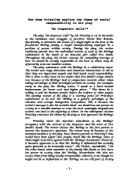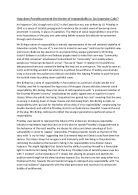Mr Birling seems to be astonished by the death of Eva Smith, but still has in mind foolishly why the Inspector has come here. “Yes yes. Horrid business. But I don’t understand why you should come here” Here Mr Birling shows how uninterested he is when the Inspector mentions it. Mr. Birling doesn’t even stop for a second to see if he could help in anyway concerning Eva’s death. This serves to suggest and confirms that when Mr Birling says that a man has to look after himself and take no responsibility for others. ‘Well, it’s my duty to keep labour costs down..’ Birling’s revealing use of the word ‘duty’. A duty is normally thought of as something which people do for legal or moral reasons, something which binds them to their obligations. Clearly, Birling has no legal obligation to keep labour costs down; presumably then he sees it as a moral obligation. This tells us about Birling’s morality, and, by implication, about how much value he places upon people.
As I have mentioned Priestley wanted to explore responsibility by placing different characters views on responsibility. Priestly expresses responsibility through the characters I believe he uses lack of the aforementioned quality. The ideal rich, well known family has been reduced to a fighting, squabbling and ashamed household. I Priestly expresses responsibility through the characters I believe he uses lack of the aforementioned quality. The ideal rich, well known family has been reduced to a fighting, squabbling and ashamed household. Birling says it is about time Eric ‘learnt to face a few responsibilities’. This tellingly ironic remark illustrates Birling’s hypocrisy. Just a few moments before, Birling denied any responsibility for the girl’s fate. Throughout the play, Birling denied any responsibility for the girl’s fate. Throughout the play, Birling is increasingly desperate to avoid ‘facing few responsibilities’. The Inspector’s pronouncements are not confined to the Birlings. They apply to society as a whole. The Inspector is the catalyst for the evening’s events.
The Inspector performs a very important speech that covers all the main themes of the play and allows Priestley to get his message across. The speech is very powerful and dramatic it is quite similar to a political speech. The reason it is so dramatic and powerful is because of the use of 'we and us´ and memorable phrases like 'fire and blood and anguish´. "We don’t live alone, we are members of one body, we are responsible for each other.” If men will not learn this lesson they will be taught in fire and blood and anguish". What Priestley is trying to get across here is that we (us) need to use collective responsibility in order to maintain peace in the world. If we don’t then it could result in a war, because personal suffering or as in this case someone is committing suicide.
Priestley achieves this by such statements as: ‘…it would do us all a bit of good if sometimes we tried to put ourselves in the place of these young women…’. The scope of the play relates to us all. The Inspector’s comments are often addressed as much to the audience as to those on stage. Sometimes the Inspector behaves as the voice of social conscience: ‘You see, we have to share something. If there’s nothing else, we’ll have to share our guilt’. He points out that social responsibilities become greater as privileges increase. There is something else implied in the Inspector’s comment. The society in which the Birlings live shares out material riches very unequally. Priestley’s use of people like Birlings and Gerald’s, have been granted the lion’s share of material wealth, they are reluctant to accept a similar-sized share of responsibility for those who have been less generously treated.
I think Priestly made the most responsible characters the older individuals because, generally, older people are more set in their ways. Ultimately, I believe that Priestly used each of the characters to portray a different part of society and he personified their actions to the death of Eva Smith.
I believe that Mr Birling has the most responsibilities, morally and socially, and the unwillingness to accept them shows his utter insolence. Priestly is giving us a warning about what will happen if society doesn't learn to accept responsibility for others. For example, when the factory workers were on strike, Mr Birling didn't care about them and what would happen to them if they lost their jobs. All he thought of was cheap labour. When the Inspector leaves, Birling wants everything to return to normal. He cannot comprehend Sheila’s and Eric’s insistence that something has to be learnt from the whole experience. When the phone call concludes the play, J.B Priestly lets us see someone who is genuinely ignorant and unfeeling towards others and one who cannot take responsibility for what he has done.
Sheila Birling, the daughter of Arthur Birling, understands the effect she had on Eva Smith unlike her father. Sheila had a cadaverous effect on the death of Eva Smith but, it was also a painful one. Sheila is a volition kind of person. She also shows her volatile side of her characters Sheila has a very different set of characteristics. Upon recognising the photograph she immediately runs out the room, as if in disgust of her previous actions, a complete contradiction to her father’s views. Whereas Arthur sacked Eva quite cold bloodedly and never gave her a second thought, Sheila´s action was the result of a fit of temper and she regretted it immediately. She seems genuine when she says, ‘It´s the only time I’ve ever done anything like that, and I’ll never, never do it again to anybody’. This is the reaction JB Preistley wanted to get from his audience. He wanted people to feel sympathy and care for each other and take responsibility for their actions.
A successful method that priestly explores responsibilty is the effect of WWI. In his closing speech the Inspector warns about what will happen if his message about men living together in a community is not heeded: ‘We don't live alone. We are members of one body. We are members of one body. And I tell you that the time will soon come when, if men will not learn that lesson, then they will be taught it in fire and blood and anguish. Good night.
In hindsight we can see that the ‘fire, blood and anguish’ that the Inspector was warning about happened in the case of the First World War. This had started because the countries of Europe, instead of existing together, had formed themselves into two camps, with the countries within them allied together. Serbia was Russia's ally, who was also on the side of Britain and France, who had both promised to protect Belgium. Austria and Germany (and later Italy) were also allies. When Austria attacked Serbia, the Russians declared war on Austria and the Germans invaded Belgium, sending Britain and France into battle. The result was a hellish war in which millions died. Had the countries been able to live together then there would not have been a war. The fact that the play was written in the midst of the Second World War suggests that Priestly was saying that the lessons of what happened in the First World War had not been learned. In using these time frames Priestley could create dramatic irony as the audience would know about events that the characters on stage wouldn't. This is just one example of the devices he uses explore responsibility.
In the second act of the play, the Inspector moves onto questioning Mrs Birling and the scene ends when Eric enters. The key themes are continued throughout these pages; especially the theme of responsibility. It is shown through Mrs Birling and how she tries to be resistant to it. She is blind to her involvement when she states 'I accept no blame for it at all', clearly indicating that she cannot accept her part in Eva Smith's death. Responsibility changes in Act Two. Mrs Birling tries to shift the blame onto someone else, so she says "I blame the young man- the father of the child", "he'd be entirely responsible". Inspector Goole wants to emphasise what she has just said so he keeps asking what should be done to the young man. She replies that he should be "compelled to confess in public his responsibility". By saying this, Mrs Birling not only shifts the blame off her own shoulders, but puts it onto her son's. She cannot accept her own guilt because she is stubborn. She doesn't see the Inspector's power and tries to outsmart him.
Mrs Birling is also used to show the theme of criminal and respectable. As Chair of a charity she is a respected person, but when she used her influences to "have the girl refused" because she didn't like her, it is almost criminal because she is stealing the poor girl's life away from her. The girl was "almost penniless, desperate" but Mrs Birling still used her 'influence' to have it refused. Even her daughter thought it was "cruel and vile". Because Mrs Birling acted in the wrong way, Eva Smith died; which links it back to the theme of responsibility. Priestley used this web of themes to show it isn't only the poor who make mistakes, but how each single person in society should accept responsibility for their own actions
In this way, Mrs Birling is used as an example for the wrong actions that people take. Other characters in the play are used in other ways. As a counterpoint to her mother, Sheila often speaks the voice of the audience. She emphasises what is going on stage, and gives clues to the audience to what they should be thinking. I think that Priestley wanted the audience to figure out Eric's secret before Mrs Birling did, so it would create tension and make them 'cringe' as she digs her son's own grave.
The character of Inspector Goole is the catalyst for the evening's events. Priestley is most successful in using the Inspector to explore the idea of responsibility. The Inspector went to the Birling household to change their views on life and to get them to think of their actions and take responsibility. The Inspector wanted the family to share responsibility. Priestly uses the Inspector to put pressure on the family and interrogate them to find out their shameful secrets. Priestly cleverly gives the Inspector an impression of massiveness, solidity and purposefulness. The Inspector always speaks precise, carefully and demanding as he interrogates the family and is always in control. He always seemed to know everything and this increases his supernatural quality.
Priestley engages the idea of responsibility in the eyes of a child, immature, not suited to the world. Eric was the last person to be interrogated by the Inspector. Eric Birling returns to the play in Act Three and under questioning from the inspector reveals the extent of his drinking, his relationship with Eva Smith and that he had spent a night with Eva and she had fallen pregnant with his child. Eric had no stable relationship with Eva as Gerald did. It also comes to light that Eric is also an alcoholic something that he had managed to keep from his parents for a number of months. This shows him as dishonest, weak and immature. He then commits a shameful act, despite it being in Eva's favour. He steals fifty pounds - which was a lot in 1920 - from his father's office. Although this was in Eva's aid, it was still a very selfish and irresponsible.
All in all Priestley is quite successful in exploring the idea of responsibility, through the characters, using dramatic techniques, using examples referring to Word War One.








